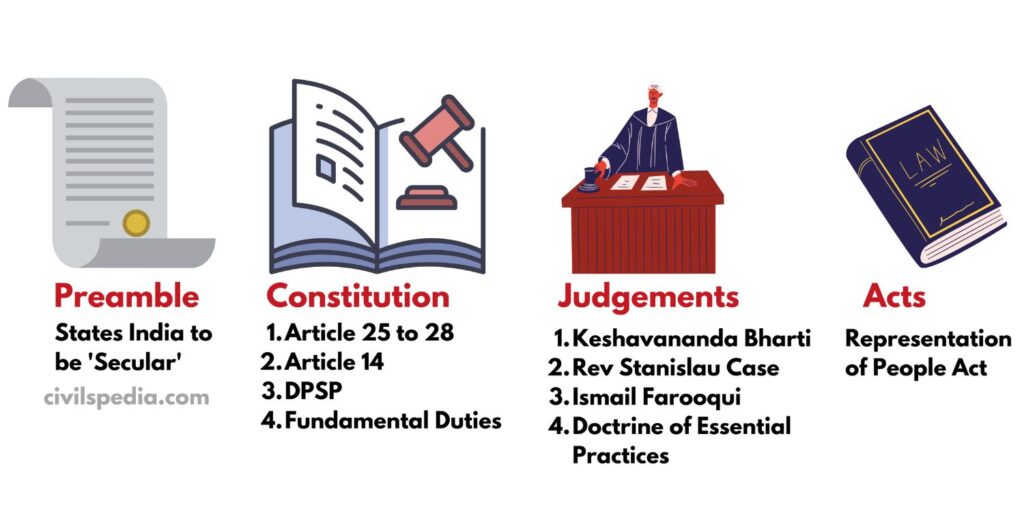India, known for its rich cultural and religious diversity, stands as one of the largest democracies in the world. One of the main reasons India is so unique is its commitment to secularism. But what exactly does secularism mean, and why is it important for India? In simple terms, secularism means that the government does not favor any religion and treats all religions equally. This is a very important idea because India is home to people from different religious backgrounds like Hindus, Muslims, Christians, Sikhs, Buddhists, and others.
However, the journey of secularism in India has not been easy. There have been many challenges that have affected the way people of different religions live together in peace and harmony. Let’s explore how secularism plays a role in Indian society and the challenges it faces.
What is Secularism?
In India, secularism is not about ignoring religion. It is about ensuring that the government does not take sides with any particular religion. The Indian Constitution, which was created after the country gained independence in 1947, lays down the foundation of a secular state. It guarantees that every citizen has the right to follow their religion freely without fear of discrimination.
For example, a Hindu can follow Hindu rituals, a Muslim can follow Islamic practices, and a Christian can follow Christianity without interference from the government. Secularism makes sure that the government provides equal opportunities for everyone, no matter their religion.

India’s Religious Diversity
India is a land of many religions. It is home to more than 1.3 billion people, and among them, there are people who follow different faiths. In fact, India has one of the most diverse populations in the world when it comes to religion.
- Hinduism is the largest religion in India, followed by the majority of the population.
- Islam is the second-largest religion, with a significant number of followers.
- Christianity, Sikhism, Buddhism, Jainism, and Judaism also have deep roots in the country.
- India also has people who follow traditional belief systems and are atheists or agnostics.
This incredible diversity has made India a beautiful melting pot of cultures, but it has also led to some challenges in maintaining religious harmony.
The Importance of Secularism for India
Secularism is important for India because it helps protect the rights of all people, regardless of their religion. It ensures that religious beliefs do not influence laws or government policies. This is crucial for India’s unity, as people from different religions need to live together in peace.
For example, secularism helps in situations where there may be tension between two religious groups. Instead of the government favoring one religion over another, secularism ensures that all religious groups are treated equally, reducing conflicts and promoting peace.

Challenges to Secularism in India
While secularism is a key principle in India’s Constitution, there are many challenges in making it a reality. Let’s look at some of these challenges.
Religious Polarization and Politics
One of the biggest challenges to secularism in India is the use of religion in politics. In recent years, some political leaders and parties have tried to gain support by appealing to the religious sentiments of people. This leads to what we call religious polarization—when people are divided based on their religious beliefs.
For example, during elections, some political parties focus on religious issues to get the votes of particular religious groups. This can create a sense of “us vs. them,” which weakens the idea of secularism. When politicians use religion to win elections, it can lead to hatred and mistrust between different religious communities.
Religious Conflicts and Violence
Sadly, India has witnessed several instances of religious conflicts and violence. These conflicts sometimes arise due to misunderstandings or a lack of respect between different religious groups. In some cases, certain people may use religion to spread hate and violence.
One of the most tragic examples of such violence was the 2002 Gujarat riots, where hundreds of people, mostly from the Muslim community, lost their lives due to religious tension. Such incidents challenge the very idea of secularism because they show how people of different religions can become enemies instead of living together peacefully.
Discrimination Against Minority Religions
Another challenge is the discrimination against minority religions in some parts of the country. Even though the Constitution guarantees equal rights to everyone, sometimes people from minority communities like Muslims, Christians, or Dalits (lower castes) face unfair treatment in society. They may be denied access to basic services like education, healthcare, or jobs just because of their religion.
This type of discrimination goes against the principles of secularism, which promises equality for all. It also creates an environment where people feel alienated, which can harm national unity and harmony.
Religious Extremism and Fundamentalism
Religious extremism is another challenge. Extremists are individuals or groups who interpret their religion in a very strict way and use violence to force others to follow their beliefs. These extremists can come from any religious background, and their actions can harm the peaceful coexistence of different religious communities.
For instance, in the past, we have seen incidents where extremist groups from different religions have clashed, leading to violence and loss of life. These acts of extremism are a big threat to secularism because they create divisions among people and weaken the unity of the nation.

Steps to Protect Secularism in India
Even though secularism faces many challenges in India, there are several steps that can be taken to protect and strengthen it:
- Education and Awareness: One of the best ways to promote secularism is through education. Schools should teach children the importance of respecting all religions and living in harmony with others. When children grow up with the values of equality and respect for all religions, they are more likely to contribute to building a peaceful society.
- Fair and Inclusive Policies: The government should continue to make policies that promote equality and justice for all citizens, regardless of their religion. By ensuring that everyone has the same opportunities and rights, the government can reduce discrimination and encourage religious harmony.
- Promoting Dialogue and Understanding: Interfaith dialogue is an important tool for building understanding between different religious communities. When people from different religions come together to discuss their beliefs and practices, they can better understand each other and reduce the chances of conflict.
- Strict Action Against Violence: The government must take strict action against those who incite violence or spread hatred in the name of religion. People who spread lies or use violence to hurt others must be held accountable for their actions.
Conclusion
India is a land of rich cultural and religious diversity, and secularism is the glue that holds this diversity together. While secularism faces many challenges in India, it is crucial for maintaining peace, unity, and harmony. The government, political leaders, and citizens all have a role to play in ensuring that secularism remains a guiding principle in the country. Only then can India truly be a land where people of all religions live together peacefully and prosperously.
Secularism, though often challenged, is the heart of India’s democracy. If we all understand its importance and work together to protect it, we can ensure that India remains a model of religious harmony for the world.




